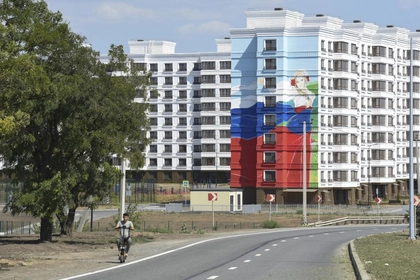Ukrainian President Volodymyr Zelensky said this week that Kyiv will not renew a gas transit contract with Moscow that allows Russia to pump gas across the country to Europe.
The Kremlin has blasted the decision, which brings uncertainty for European countries still buying Russian gas.
JOIN US ON TELEGRAM
Follow our coverage of the war on the @Kyivpost_official.
Here's what we know and what it could mean:
- Transit deal -
Despite Russia's invasion in 2022 and conflict with Moscow-backed separatists since 2014, Ukraine has continued to allow Russian gas to transit its territory to Europe.
The deal has financially benefited both sides, but appeared increasingly incongruous with Kyiv actively targeting Russian energy infrastructure and blasting countries that buy Russian energy as funding the invasion.
Zelensky said this week a 2019 agreement to ship Russian gas to Europe via Ukraine until the end of 2024 would not be extended.
That contract between Ukraine's Naftogaz, the state pipeline operator GTSOU and Russia's Gazprom had outlined a "minimum transit volume" of 65 billion cubic metres (bcm) of gas for 2020 and 40 bcm for 2021-2024.
Zelensky welcomed the agreement at the time, which he said would generate at least $7 billion for Kyiv.
Transit volumes plummeted following the invasion as the EU cut its purchases and Kyiv closed one of the two entry points for Russian gas.
Russia shipped 14.6 bcm across Ukraine in 2023 -- down almost two thirds from the 41.6 bcm that transited in 2021.

Ukrainian Naivety is Both Good and Bad
Before the coronavirus pandemic, annual volumes regularly topped 80 bcm.
- European reliance -
Europe's gas imports from Russia have fallen more than 90 percent since Moscow invaded in 2022, while purchases from the United States, Norway, Azerbaijan and Algeria have soared.
But some individual countries remain heavily reliant on Russia due to their geographic position.
The EU says 69 percent of Slovakia's gas imports and 60 percent of Austria's came from Russia in 2023, for instance.
Countries that will be hit by the end of transit via Ukraine have "other supply solutions," Brussels says.
Italy, for instance, has already largely weaned itself off Russian gas and could buy even more from Algeria.
Others, such as land-locked Slovakia, have no obvious alternative.
- Ukrainian, Russian losses -
Gazprom, which used to generate huge revenues for the Russian government, has faced financial difficulties since the EU drastically cut its purchases of Russian gas.
Experts quoted by the Russian business daily Vedomosti, estimate the loss of Ukrainian transit routes could cost the company another $5.5 billion a year, or six percent of its revenue.
Ukraine currently collects around $800 million in transit fees -- approximately 0.5 percent of its GDP -- though the majority goes towards operating costs.
- Alternative routes -
The Ukrainian transit route has accounted for just under half of Russia's gas exports to Europe.
Around 42 million cubic metres is shipped daily via the Sudzha metering station -- the last open entry point for Russia gas heading into Ukraine.
That route was brought into question earlier this month after Kyiv's forces captured it in a shock cross-border offensive. But shipments have continued.
Since the explosions on the Nord Stream pipelines in September 2022, Russia has limited options to increase supplies to Europe.
A major alternative route is the TurkStream pipeline, which takes Russian gas under the Black Sea to Turkey and then up to Bulgaria, Serbia and Hungary via the Balkan Stream network.
Europe also purchases Russian liquefied natural gas (LNG), though capacity is limited by available port facilities, onwards transmission and cargo ships.
One alternative for the Ukrainian transit route is to ship gas from Azerbaijan in the Caucasus to Europe via the same pipeline network.
Zelensky has indicated he is in talks with energy-rich Baku on the issue, but the most feasible options would still involve using Russian infrastructure in some capacity.
Another option would be for Russia to up supplies via its Turkish route. However, that also faces capacity constraints, despite Russian President Vladimir Putin's desire to develop a "gas hub" in Turkey.
You can also highlight the text and press Ctrl + Enter






